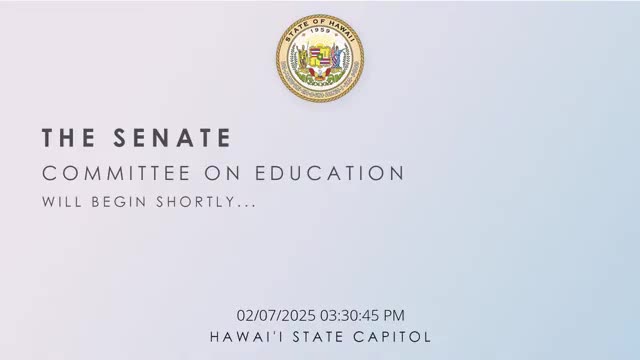Committee backs statewide dyslexia-sensitive screening, estimates $750,000 annual cost
Get AI-powered insights, summaries, and transcripts
Subscribe
Summary
Lawmakers voted to pass SB421 with amendments requiring a dyslexia-sensitive universal screener for kindergarten through grade 3, continued universal ELA screening through grade 9, structured literacy components, collaboration with teacher prep programs, and an appropriation estimated at $750,000 per year.
Senators on the Education committee voted to pass Senate Bill 421 with amendments that require the Department of Education to administer a dyslexia-sensitive universal screening for students in kindergarten through grade 3, continue a universal English language arts screening through grade 9, and collaborate with teacher preparation programs to ensure candidates receive training in evidence-based literacy instruction.
Heidi Armstrong, DOE assistant superintendent, recommended replacing the bill’s text with SB1001 language to better reflect the Department’s ongoing literacy work but said the department stands in support. Witnesses from charter-school leadership, advocacy organizations, and the State Council on Developmental Disabilities testified in support, describing personal and professional experiences of undiagnosed dyslexia and the value of earlier detection. Chase Lover (Hawaii State Council on Developmental Disabilities) said his dyslexia was not diagnosed until age 25 and described years of struggle in school prior to diagnosis.
Committee members pressed the DOE on logistics and cost. The Department estimated about $750,000 per year to implement universal K–3 dyslexia-sensitive screening statewide and explained that the screener is a screening tool (not a diagnostic assessment) to identify students at risk; formal diagnosis would still require a more detailed assessment by a licensed professional. The DOE said schools already use a variety of assessment tools (for example, DIBELS) and the bill’s implementation would likely recommend an approved list of screeners rather than mandate a single vendor. Senators asked whether the DOE would duplicate existing screening efforts and how screening would be administered in classrooms; DOE witnesses said screeners require adult administration and logistics vary by school.
After discussion the committee adopted amendments clarifying structured literacy components (phonological awareness, phonics/decoding/spelling, fluency, vocabulary, comprehension, and written expression), included an appropriation for a dyslexia-sensitive universal screening and defected the effective date to July 1, 2050. Senators requested that the DOE coordinate its existing assessment work to avoid duplication and include that statement in the committee report.
Votes and outcome: The committee voted to pass SB421 with amendments (structured literacy definition and an appropriation for the universal screener). Recorded comment during the hearing repeated the $750,000-per-year estimate.
Why this matters: Early screening is intended to identify students at risk for dyslexia earlier so schools can target interventions; the estimated recurring cost will be factored into budget decisions and the DOE was asked to coordinate existing assessments to avoid redundant testing.
